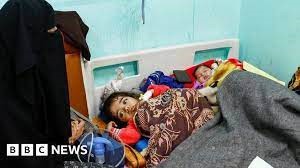Doctors across Gaza have described operating on patients without anaesthetic, turning people with chronic conditions away, and treating rotting wounds with limited medical supplies.
“Because of the shortage of painkillers, we leave patients to scream for hours and hours,” one told the BBC.
The World Health Organization (WHO) has described the state of healthcare in Gaza as being “beyond words”.
It said 23 hospitals in Gaza were not functioning at all as of Sunday – 12 were partially functioning and one minimally.
The health agency said air strikes and a lack of supplies have “depleted an already under-resourced system”.
The Israel Defense Forces (IDF) says Hamas “systematically uses hospitals and medical centres for its terror activities”.
In a statement to the BBC, it said the IDF “did not ‘attack’ hospitals, but rather entered specific areas… [to] neutralise Hamas’ infrastructure and equipment, and apprehend Hamas terrorists, while acting with great caution”.
It said it was allowing humanitarian aid into Gaza, including medical supplies.
Aid organisations, including the WHO, say there have been “repeated access restrictions and denials”.
Many of Gaza’s hospitals are overcrowded and have limited equipment, healthcare workers say. There are reports that some hospitals in southern Gaza are operating at over 300% of their bed capacity.
Four field hospitals have been set up in Gaza, with 305 beds combined, according to the WHO.
On Sunday, it said the Nasser hospital in southern Gaza was the latest facility to become non-operational, following a raid by Israeli forces.
The IDF said on Sunday night it had found weapons at the hospital, as well as medicines with the names and photos of hostages on them, and had apprehended “hundreds of terrorists” hiding there. “Hamas continues to put Gaza’s most vulnerable citizens in serious danger by cynically using hospitals for terror,” it earlier told the BBC.
Staff at nearby hospitals say the operation at Nasser has put extra strain on them.
Yousef al-Akkad, director of the Gaza European Hospital in the southern city of Khan Younis, described the current situation there as the “worst we’ve faced since the beginning of the war”.
“This situation was severe before, so what do you think it’s like after receiving thousands more who’ve been displaced and are now staying in the hallways and the public areas?”
He said the hospital did not have enough beds for the patients needing treatment, so staff were laying sheets over metal frames and wood, and putting “a lot of patients on the floor with nothing at all”.
Other doctors from across the Gaza Strip described similar situations. “Even if there is somebody with cardiac arrest or cardiac problems, we put them on the floor and start to work on them,” said Dr Marwan al-Hams, director of Rafah’s Martyr Mohammed Yusuf al-Najjar Hospital.
A Hamas political committee appoints directors of public hospitals in Gaza. In some cases, these directors were in place before Hamas took control of the Strip.
Doctors say they are struggling to work with limited medical supplies. “We cannot find a drop of oxygen,” one told the BBC.
“We’re missing anaesthetics, supplies for the ICU, antibiotics and lastly painkillers,” said Dr al-Akkad. “There are a lot of people who were severely burnt… we don’t have any suitable painkillers for them.”
One doctor confirmed that operations were going ahead without anaesthetic.
A WHO team said they recently met a seven-year-old girl at the European Gaza hospital who was suffering from 75% burns, but unable to receive pain relief because of short supplies.
Dr Mohamed Salha, acting director of northern Gaza’s Al-Awda hospital, said people had been transported for treatment there on donkeys and horses.
“The catastrophe is when the patients’ wounds are rotting, as the wounds have been open for more than two or three weeks,” he said.
He said doctors there had performed surgeries by the light of headtorches because of electricity shortages.
Source: BBC


Comments are closed.